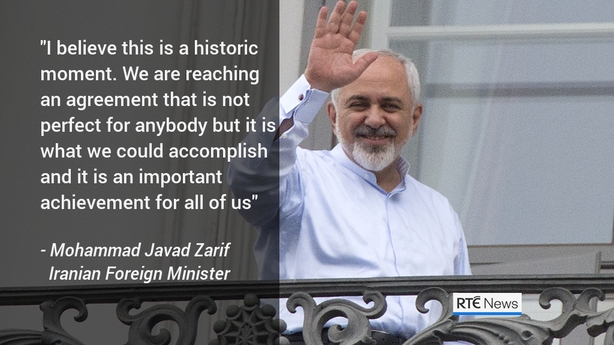US President Barack Obama has heralded a nuclear deal with Iran as an opportunity worth seizing and warned Congress he would veto any legislation that prevented its successful implementation.
Mr Obama, speaking at the White House, said every pathway for Iran to get a nuclear weapon was cut off under the agreement.
He said the nuclear deal with Iran offered a chance to move in a "new direction" in relations with Iran, but promised a skeptical Israel that Washington would not abandon it.
"Our differences are real. The difficult history between the nations cannot be ignored. It is possible to change," Mr Obama said.
"This deal offers an opportunity to move in a new direction. We should seize it."
Iran and six major world powers reached the deal earlier, capping more than a decade of on-off negotiations with an agreement that could potentially transform the Middle East.
Under the deal, sanctions imposed by the United States, European Union and United Nations would be lifted in return for Iran agreeing long-term curbs on a nuclear programme that the West has suspected was aimed at creating a nuclear bomb.
Reaching a deal is a major policy victory for both Mr Obama and Iran's President Hassan Rouhani, a pragmatist elected two years ago on a vow to reduce Iran's diplomatic isolation.
Both men face scepticism from powerful hardliners at home after decades of enmity between countries that referred to each other as "the Great Satan" and a member of the "axis of evil".
Final talks in Vienna, Austria involved nearly three weeks of intense round-the-clock negotiations between US Secretary of State John Kerry and Iran's Foreign Minister Mohammad Javad Zarif.
Mr Zarif described the move as "a historic moment" but acknowledged the deal was "not perfect".

On Twitter, Mr Rouhani said the deal will open "new horizons" now that "this unnecessary crisis" has been resolved.
The Iranian leader added that the talks had shown "constructive engagement works."
Western diplomats said under the final agreement, Iran had accepted a "snapback" mechanism, under which some sanctions could be reinstated in 65 days if it violated the deal.
A UN weapons embargo would remain in place for five years and a ban on buying missile technology would remain for eight years.
EU foreign policy chief Federica Mogherini said the deal is a "sign of hope for the entire world", adding that it "can open the way to a new chapter in international relations".
Israeli Prime Minister Benjamin Netanyahu has criticised the deal, saying it was "a historic mistake for the world."
"In every area where it was supposed to prevent Iran attaining nuclear arms capability, there were huge compromises," his office quoted him as saying.
Responding to these concerns, Mr Obama promised to "continue our unprecedented efforts to strengthen Israel's security, efforts that go beyond what any administration has done before."
Israeli Prime Minister Benjamin Netanyahu said Israel would not be bound by the deal and would defend itself.
In a statement he underlined Israel's disappointment in the deal and described it as a "stunning, historic, mistake."
"Israel is not bound by this deal with Iran because Iran continues to seek our destruction. We will always defend ourselves," he said.

